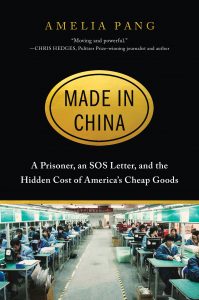 by Amelia Pang
by Amelia Pang
Stalinist Plutocracy was never going to be a pleasant social arrangement. But now that Red China is the world’s most influential power, surveillance technology so cheap and artificial intelligence software so widely deployed (accurate or not), Stalinist Plutocracy is amplifying there. Tragically, UnitedStatesian consumers made it possible, and are funding its global expansion.
Made in China: A Prisoner, an SOS Letter & the Hidden Cost of America’s Cheap Goods by journalist Amelia Pang explains what’s changed for the (far) worse for workers in the last 30 years. Pang has won recognition for her investigative work on fraudulent “organic” food imports, sexual violence against indigenous women and the exploitation of smuggled immigrants recruited to work in Chinese restaurants. Now her focus is on China itself. In her book, she documents how wishful thinking by both political parties has funded an explosion of for–profit slave camps. Integrating the products of Communist Party plutocrats into the global economy did not make the apparatchiks more cuddly.
Global capital’s lust for growing streams of cheap stuff to sell to the precariat at dollar stores—and Pelotons to the middle class—creates irresistible demand. The Davos crowd’s addiction to ratcheting down production costs drives Chinese leaders’ calculations. They need more free labor to keep up.
The “market” requires more prisoner–workers, thus more criminalizing of behaviors not previously crimes. Pang’s book documents how the supply chain moves enslaved people from cities to rural “Re–education Through Labor” camps (RTLs), no longer running through the courts. Even Stalinist courts require processing time; supply chains are all about efficiency. In the new China, rendition from one’s home to the concentration camp dispenses with the show trial.
Pang’s book wraps a set of essays mostly around Sun Yi. A brave prisoner building seasonal decorations for an American outsourcer to sell through KMart, he secreted a personal note in the boxes begging for help. His history, voice, and the consequences on two continents illustrate in a powerful fashion the atrocities faced by many millions.
In the new China, rendition from one’s home to the concentration camp dispenses with the show trial.
What was Sun Yi “in” for? Belonging to a social/spiritual/health club called Falun Gong, the most popular non–Party organization in Red China before the leaders cracked down. Sun wouldn’t renounce his affiliation.
Pang argues that the crackdown is not for specific Falun Gong activities or beliefs. Her theory is that the Communist Party feels the need to be the sole distributor of marketing messaging. Other channels may not be intentionally subversive, but once established, they might be outside the span of Party control.
This explains the PRC’s dirty war on Muslims (against all the indigenous Uighur people, most but not all of whom have a Muslim background) and on Christians. These are competing affiliations more than direct anti–Party cognates, but it hasn’t stopped mass incarceration of 1 to 3 million Uighur folk.
Pang documents the latest commercial innovation, a perfect fit for the globalizers’ unslakeable expansionist thirst. With increasing competition from countries that supply food, drugs and hard goods, PRC has home–grown a new service product that less repressive countries can’t recreate: Discount organ transplant clinics. They harvest the organs from…you guessed it. While concentration camp health facilities are rudimentary, visiting medical personnel will provide non–smokers with checkups, gathering DNA and other details in the process.
The database of details apparently makes for quick matching to a buyer. While legitimate transplant experts question the origin of cheapie human body parts, price seems to trump market and consumer concerns for the hidden cost to the victims.
Pang points out the magnitude of the challenge of pushing back. Many woke consumers demand that popular brands inspect factories. Pang, however, explains that even a factory that seems square, like Apple’s, may (and in Apple’s case does) buy component parts from torture shops without necessarily knowing (or perhaps not caring as long as they pass inspection).
Most inspections are cursory, to control cost. Further, long supply chains mean factories source components from suppliers who in turn source from others—the inspections never catch the off–site enslavers. Thus, even the woke–est consumers buying Made in China are subsidizing the Stalinist plutes’ torture machine.
The book is well worth reading. Since Red China seems to have more political prisoners than the rest of the world combined, scale alone makes it a critical human rights issue. But the slave labor economy there also reinforces the Davos crowd’s need to drive down labor and health standards to those of the PRC everywhere they invest.
Ending US complicity in China’s atrocities will be tough, but it’s not hopeless. Pang’s “What We Can Do” has a checklist—behaviors to tweak and questions to ask the corporations that you give your business to. There are some new ways (less likely to be new to WIP readers than the general population) to weigh price and re–consider the consequences of your consumption.
“Reach across the aisle” dreamers will find addressing Red China’s endemic human rights violations a worthy effort. Both the libertarian Right and the Christian Right are mortified at PRC’s oppression of Christians. The oil–war priapic Right (the Bush Junior–Cheney wing) is scared witless of PRC’s increasing weapons muscle and cyber–shenanigans. From my point of view, PRC policy would provide a viable point of entry for a Red–Blue collaboration. Bring Made in China to your bi–partisan book club. See where a mutually–respectful conversation leads.
Jeff is an activist who’s been advocating avoidance of “made in China” products for decades, but who still learned a ton of new information from Pang’s book.

Be First to Comment